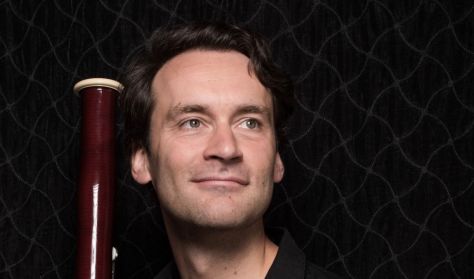
Concertino: Purcell, Françaix, Britten
Purcell
Françaix
Britten
Bogányi
Pilz

Purcell
Françaix
Britten
Bogányi
Pilz
February
28
March
1
Liszt Academy, Grand Hall
Friday 28th
Saturday 1st
Henry Purcell: Abdelazer – suite, Z. 570
Jean Françaix: Concerto for bassoon and orchestra
Benjamin Britten: Variations on a Theme of Frank Bridge, Op. 10
Bence Bogányi (bassoon)
concertmaster: János Pilz
If he had only one bassoonist to listen to for the rest of his life, it would be him – a journalist for The Spectator has said of the music of Bence Bogányi. This time, the Budapest Festival Orchestra’s musician will play the solo of Jean Françaix’s rarely performed concerto. An easily palatable piece reminiscent of tango or ragtime music, the work will serve as the backbone of the season’s first Concertino performance. Led by János Pilz, this concert of the chamber music series comes as winter gives way to spring. The performance will begin with movements from Purcell’s theater accompaniment music, telling the tragic and shocking story of the Moor Abdelazer and the Queen of Spain. In the second half of the event, Britten’s series of variations serve as an example of a student’s tribute to their teacher: written to the theme of his composition teacher, Frank Bridge, the work is what delivered Britten fame.
Aphra Behn, a prominent female dramatist of her time, was regularly criticized over the immorality of her plays. Certainly, the story of Abdelazer, who seduces the wife of the Spanish king while in captivity and then joins forces with her to murder the king, is no fairytale. The plot includes adultery, betrayal, violence and murder, and ultimately, both the queen and the title character die. Theater pieces in the late 17th century were regularly performed with accompanying music, designed to indicate the beginning and end of the piece, and the beginnings and ends of each act, among others. Purcell’s nine movements written for string instruments include overtures, airs and period dances. Premiering in 1695, the year of the composer’s death at the age of thirty six, the piece also appeared several years later as a suite.
Composing light and pleasant music nonetheless full of content, Jean Françaix was a specialist of the woodwinds. His 1979 concerto was dedicated to bassoonist Maurice Allard. The opening movement – misleadingly – opens with crying orchestral measures, which are immediately resolved by the tango-like music of the bassoon, rich in extended rhythms. Following a lyrical middle part, the movement concludes with a slow solo and an orchestral downbeat. Next, an introduction-like, bouncy scherzando follows with a middle section reminiscent of a movie score, with plenty of scales and repeated melodies for the bassoon section; the slow movement, initially timid before shining brightly, is introduced by the ominous music of the low strings. Launching with rectangular motifs, the finale recalls the first theme of the opening movement in the bassoon cadenza, before the closing notes.
“For F. B.: A tribute with affection and admiration,” Britten wrote at the beginning of the score, wrapping up the composition after four weeks. The double lines at the end conclude a series of variations on a string quartet theme originally written by his teacher, the composer and violist Frank Bridge. Britten himself also played the viola, and the piece therefore features very finely crafted string textures. The ten variations serve both as genre parodies and presentations of Britten’s exceptional personal qualities. This is how Bridge himself (theme) is presented, followed by his integrity (adagio), energy (march), charm (pastorale), humor (Aria Italiana), tradition (bourrée), enthusiasm (waltz), vitality (tremolo), sympathy (funeral march) and reverence (unheimlich), before a fugue and the finale conclude the piece.
A közel 30 éves Cotton Club Singers, és a 40 esztendős Hot Jazz Band közös produkciója hangzásában, valamint látványában egyedülálló…
item(s) in basket
total:
Time limit has expired. Please, put item(s) in to basket again.